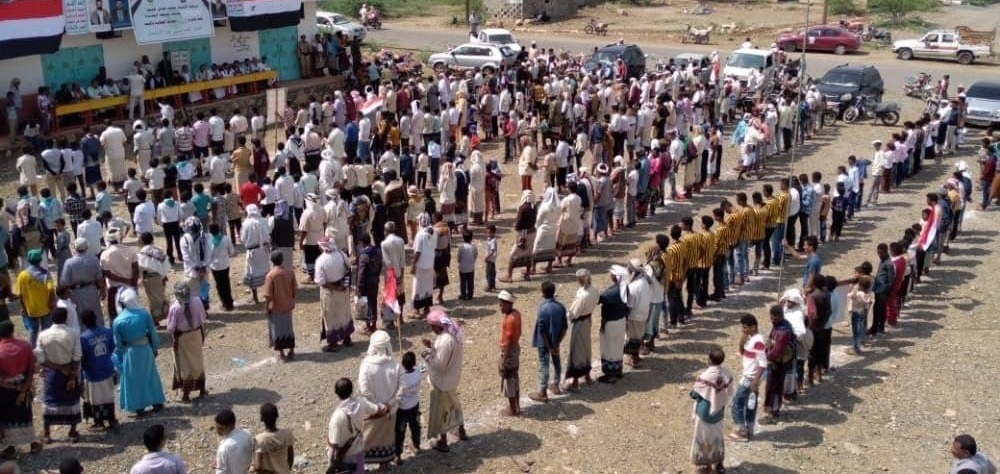AhlulBayt News Agency (ABNA): Yemenis celebrated seventh anniversary of their 2014 "youths revolution" that ousted the largely reliant government of President Abdrabbuh Mansour Hadi as over six years of their resistance to all-out blockade and apparently unequal war waged by Saudi Arabia have obviously come to fruition, making the victory over the foreign enemies and the home mercenaries look too close.
Celebrating the day, masses of Yemenis held an assembly in the capital Sana'a during which they signed a statement inviting the "deceived" to seize the public pardon opportunity and re-embrace their country.
Sanaa's different revolution: seven years on
The Yemenis believe that the 2014 revolution was a complement to the 2011 revolution that failed to meet its goals.
In 2011, former Yemeni dictator Ali Abdullah Saleh resigned from power as Persian Gulf Cooperation Council (P)GCC) imposed on him its initiative, enjoying an immunity from any trial for abuse of power and corruption. His power was transferred to Vice President Mansour Hadi to maintain the dictatorship that was reliant on Riyadh.
In fact, the initiative of the (P) GCC did only resulted on the dignified departure of Saleh and his corrupt orbit from power and the preservation of the structure of the regime and the transfer of power to corrupt individuals who have been accomplices to Saleh for many years. After the transfer of power and the formation of a new government by Hadi, the revolutionary movements continued until the Ansarullah movement made it to leadership of the uprising. With Ansarullah involvement that focused on pushing forward the legitimate demands of the revolutionaries, the uprising ran faster, leading to Hadi resignation and fleeing from the country to Saudi Arabia.
Salafi and Takfiri forces stepped in with the green light of Riyadh to suppress Ansarullah, only to find the revolutionary movement invincible. They fled finally. The revolutionary forces peacefully entered Sana'a on September 21 to push forward with their objectives.
Six months later, the Saudi-led Arab coalition started its aggression under the excuse of restoring to power the fugitive President Hadi but for the true reason of partitioning Yemen for easier control. In fact, September 21 is a turning point in the contemporary history of Yemen drawing a line between staying dependent on Saudi Arabia under Saleh and Hadi or freeing itself from the yoke of Saudi dominance and gaining independence and freedom by means of resistance.
Despite the crimes committed by the Saudi aggression and the economic siege, which worsened living conditions in the already impoverished country, the Yemeni people have been able to resist the atrocities of the fully armed militaries of the Western and Israeli-backed Saudi Arabia and the UAE and force them accept defeat.
Saudi and Emirati leaders, initially immersed in the illusion of seizing the whole Yemen in a matter of a few days but faced ironclad resistance from Ansarullah, now are seeking ways out of Yemen quagmire as the massive retaliatory drone and missile strikes of Yemeni forces leave them in total frustration.
Just contrary to Riyadh that lost its credibility and image regionally, Ansarullah has turned into a weighty power player in the region with influence on regional developments and respected by nations. September 21 marks the real "independence, sovereignty, and dignity" and the end to the blatant American and Saudi interference in Yemeni affairs.
Sana'a and Aden's different conditions on revolution anniversary
The seventh anniversary is coming as Sana'a and other provinces governed by Ansarullah-affiliated Supreme Political Council and National Salvation Government are witnessing security and stability unlike those occupied by Saudi Arabia and the UAE. Last year, the interior ministry of the National Salvation Government revealed that since the beginning of the aggression until December 2019, more than 45,930 security operations were successfully carried out, including countering the terrorist factions affiliated with al-Qaeda and ISIS.
Since the UAE-backed Southern Transitional Council (STC) and the Saudi-supported forces, calling themselves the "legitimacy forces" made Aden the seat of their governance, the southern provinces underwent worst ever public services crisis, with power, health sector, national currency, and security collapsing hard.
In recent days, hundreds of citizens in Socotra Island in southeast held protests against the STC. Similar protests were also arranged in other regions, in which security forces killed and wounded a number of demonstrators.
A major part of oil revenues and central bank cash after 2014 developments were transferred to Aden, a stop-gap capital hosting Hadi, and the watertight blockade and sanctions on Sana'a are not on Aden. Still, Ansarullah-administered regions have done, and are, much better; something daily adding to the number of those in southern and central provinces demanding expulsion of aggression forces and return to Sana'a governance.
/120

